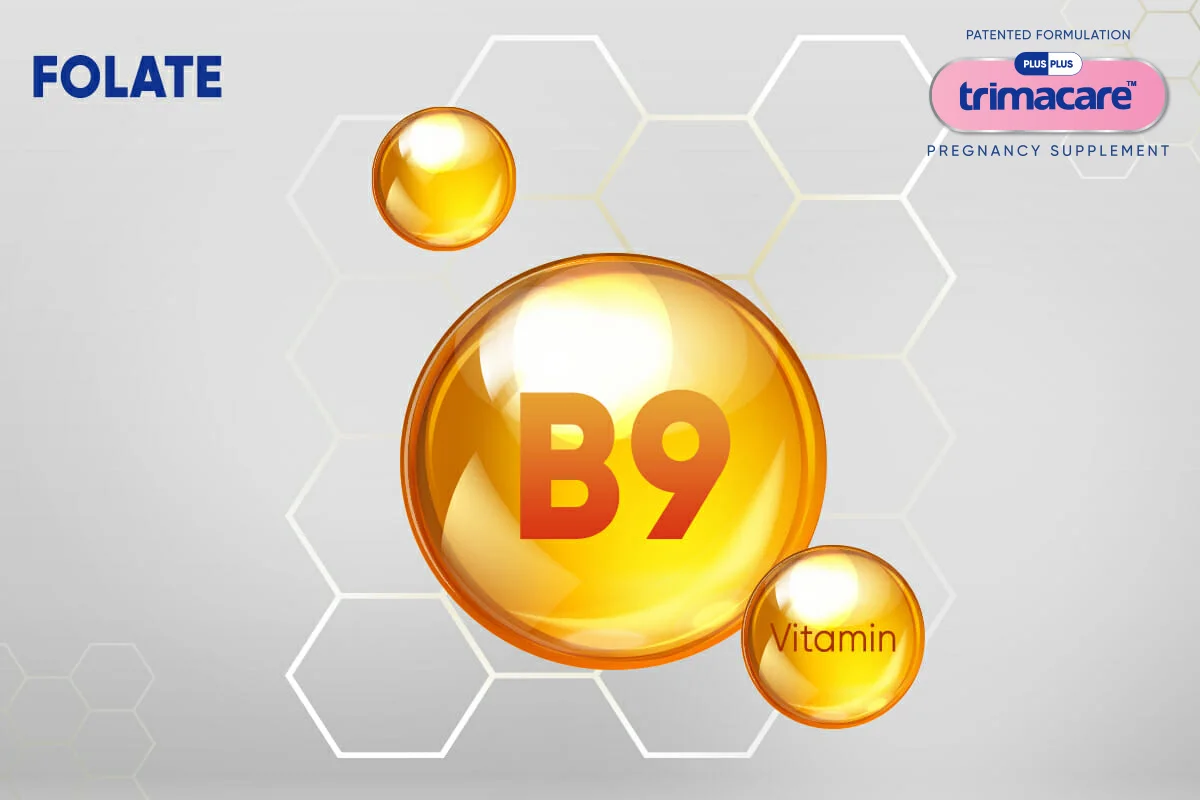Nutrition plays a crucial role during pregnancy. Folate is one of the important nutrients essential during this phase. Folate also known as vitamin B9 is water-soluble and highly involved in DNA synthesis, cell formation and formation of healthy red blood cells. Folate during pregnancy is important for maximising cell function and growth. The importance of folate during pregnancy cannot be exaggerated, as it directly affects both the mother and the baby.
What is folate?
Folate is a natural form of vitamin B9, a vital nutrient that our body needs but cannot produce by itself. It is vital in synthesising DNA and RNA, making healthy red blood cells, and helping in rapid cell growth – functions that are important during pregnancy.
Some of the common folate-rich foods in India include green leafy vegetables such as fenugreek (methi) or spinach(palak), lentils(dal), chickpeas(chana), oranges, bananas and whole grains. Consuming a variety of these food items ensures proper levels of folate and overall well-being.
Folic acid vs Folate: How are they different?
It is very important to understand the difference between folate and folic acid. Folate is naturally found in foods, while folic acid is the man-made version taken in supplements and fortified foods.
Some women have genetic differences that make it more difficult to convert folic acid into its biologically active form, so highly available forms like l-methylfolate can be a better choice.
What is the importance of folate in pregnancy?
- Fetal Neural Tube Development
Folate for pregnant women is important for the development of the neural tube, which develops into the brain and spinal cord of the baby. Adequate intake of folate early in pregnancy reduces the chance of severe birth defects known as neural tube defects (NTDs) including anencephaly and spina bifida.
- DNA Synthesis and Cell Growth
Pregnancy involves fast cell division and growth. Folate during pregnancy helps in DNA synthesis and cell replication, powering the baby’s overall growth.
- Prevention of Maternal Complications
Folate is essential for producing healthy red blood cells, thus avoiding anemia during pregnancy. This leads to increased oxygen to the baby, promoting fetal growth and reducing maternal tiredness.
- Other Benefits
Other folate benefits in pregnancy include a reduced risk of preterm birth, low birth weight and increased brain growth.
Suggested Folate Intake During Pregnancy
WHO and ICMR recommend that pregnant women consume 400-1000mcg of folate daily. Start before conception and continue during pregnancy so that the neural tube closes normally, usually within the first 28days.
Sources of folate
Although green leafy vegetables, citrus fruits and pulses are folate-rich foods in India, they alone are not sufficient while considering cooking losses. This is why prenatal vitamins with folate, fortified foods and supplements are recommended by doctors to address the daily requirement of folate.
How does Trimacare help during pregnancy?
Trimacare prenatal supplement is specially formulated for Indian women, providing trimester-specific nutrition.
- 1. State-of-the-art Folate Formulation
Trimacare includes L-methyl folate, a 7 times more bioavailable form of folic acid, to prevent neural tube defects and support maternal tissue growth. It is absorbable even by those who have the MTHFR gene mutation.
- Comprehensive prenatal nutrition
Trimacare not only contains folate. It provides 20+ nutrients including omega-3, Vitamin B6, B12, Vitamin C and D, Zinc, Iodine etc specifically formulated for every trimester.
- Benefits of Trimacare prenatal supplement
- Prevents the risk of neural tube defects and promotes the baby’s brain and spinal development.
- Increases maternal immunity and supports speedy postpartum recovery.
- Trimacare prenatal supplements are formulated under the supervision of renowned doctors, nutritionists, and experts under the guidance of the ICMR and WHO Multi-Micronutrient Model.
This makes Trimacare the best folate supplement in India.
- Risks of folate deficiency in pregnancy
Inadequate folate can result in:
- Neural tube abnormalities
- Maternal anemia, weakness
- Inadequate fetal development, increased risk of premature birth and abortion
Unfortunately, folate deficiency in pregnancy is prevalent in India due to dietary patterns and lack of awareness.
Conclusion-
Folate in pregnancy helps shield your baby from severe birth defects, keeps you healthy and ensures optimal growth.
Tough dietary intake is important, good-quality supplements such as Trimacare prenatal supplement ensure you get enough folate you need also giving you comprehensive support throughout the pregnancy period.
FAQs
-
Why is folate necessary during pregnancy?
Pregnancy folate is crucial for the baby’s brain and spinal cord development. It lowers the risk of neural tube defects (NTDs), aids in DNA synthesis, and prevents maternal anemia. That makes the role of folate during pregnancy undeniable for both the mother and the baby.
-
What is the difference between folic acid and folate?
Folic acid vs folate is a topic of discussion. Folate refers to the natural form of vitamin B9 that occurs in foods such as leafy greens and lentils. Folic acid is the artificial form found in supplements and fortified foods. Some women metabolise folic acid less effectively, so bioactive forms like L-methylfolate are recommended.
-
What are the best natural sources of folate for pregnant women?
Good sources of folate in India are spinach, methi, lentils, chickpeas, and oranges. It is difficult to achieve the higher requirements in pregnancy with diet alone, and hence pregnancy vitamins containing folate or fortified foods may be recommended.
-
How much folate should a pregnant woman consume every day?
The guidelines of WHO and ICMR suggest 400–1000 mcg of folate per day for pregnant women. Preconception and continuation during pregnancy are ideal to prevent neural tube defects.
-
What is the consequence of folate deficiency during pregnancy?
Folate deficiency during pregnancy results in neural tube defects, anemia, weakness, intrauterine growth retardation, and preterm labor and abortion. These conditions are widespread in Indian women because of dietary deficiencies.
-
How does folate improve my baby’s long-term health?
The pregnancy benefits of folate extend beyond preventing birth defects. Proper folate nourishes the baby’s brain development, normal birth weight, and even lower risks of some chronic illnesses in the future.
-
Does taking folate during pregnancy also benefit after childbirth?
Yes, pregnancy folate not only helps in the baby’s growth — it also makes it easier for the mother to recover after delivery by enhancing red blood cell production and alleviating postpartum anemia. That’s why most doctors recommend continuing folate for pregnant women even after delivery.
A Certified Nutritionist with a rich healthcare background in health journalism, the author has immense experience in curating reader-friendly, engaging, and informative healthcare blogs to empower readers to make informed pregnancy-related decisions.













